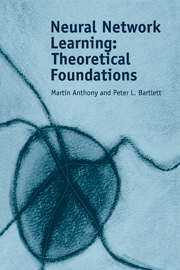Book contents
- Frontmatter
- Contents
- Preface
- 1 Introduction
- Part one Pattern Classification with Binary-Output Neural Networks
- 2 The Pattern Classification Problem
- 3 The Growth Function and VC-Dimension
- 4 General Upper Bounds on Sample Complexity
- 5 General Lower Bounds on Sample Complexity
- 6 The VC-Dimension of Linear Threshold Networks
- 7 Bounding the VC-Dimension using Geometric Techniques
- 8 Vapnik-Chervonenkis Dimension Bounds for Neural Networks
- Part two Pattern Classification with Real-Output Networks
- Part three Learning Real-Valued Functions
- Part four Algorithmics
- Appendix 1 Useful Results
- Bibliography
- Author index
- Subject index
5 - General Lower Bounds on Sample Complexity
Published online by Cambridge University Press: 26 February 2010
- Frontmatter
- Contents
- Preface
- 1 Introduction
- Part one Pattern Classification with Binary-Output Neural Networks
- 2 The Pattern Classification Problem
- 3 The Growth Function and VC-Dimension
- 4 General Upper Bounds on Sample Complexity
- 5 General Lower Bounds on Sample Complexity
- 6 The VC-Dimension of Linear Threshold Networks
- 7 Bounding the VC-Dimension using Geometric Techniques
- 8 Vapnik-Chervonenkis Dimension Bounds for Neural Networks
- Part two Pattern Classification with Real-Output Networks
- Part three Learning Real-Valued Functions
- Part four Algorithmics
- Appendix 1 Useful Results
- Bibliography
- Author index
- Subject index
Summary
Introduction
In the previous chapters we showed that a class of functions of finite VC-dimension is learnable by the fairly natural class of SEM algorithms, and we provided bounds on the estimation error and sample complexity of these learning algorithms in terms of the VC-dimension of the class. In this chapter we provide lower bounds on the estimation error and sample complexity of any learning algorithm. These lower bounds are also in terms of the VC-dimension, and are not vastly different from the upper bounds of the previous chapter. We shall see, as a consequence, that the VC-dimension not only characterizes learnability, in the sense that a function class is learnable if and only if it has finite VC-dimension, but it provides precise information about the number of examples required.
A Lower Bound for Learning
A technical lemma
The first step towards a general lower bound on the sample complexity is the following technical lemma, which will also prove useful in later chapters. It concerns the problem of estimating the parameter describing a Bernoulli random variable.
Lemma 5.1Suppose that α is a random variable uniformly distributed on {α−, α+}, where α− = 1/2 − ∈/2 and α+ = 1/2 + ∈/2, with 0 < ∈ < 1. Suppose that ξ1, …, ξmare i.i.d. (independent and identically distributed) {0, 1}-valued random variables with Pr(ξi = 1) = α for all i. Let f be a function from {0, 1}mto {α−, α+}.
- Type
- Chapter
- Information
- Neural Network LearningTheoretical Foundations, pp. 59 - 73Publisher: Cambridge University PressPrint publication year: 1999

